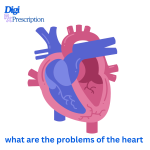
Common Heart Problems: Causes, Symptoms, and Prevention
The heart is one of the most vital organs in the human body, responsible for pumping blood and supplying oxygen to every cell. However, various heart conditions can disrupt this function, leading to serious health risks. Understanding heart problems, their causes, symptoms, and prevention can help in early detection and management.
1. Coronary Artery Disease (CAD)
Cause:
CAD occurs when the coronary arteries become narrowed or blocked due to plaque buildup (atherosclerosis), reducing blood flow to the heart.
Symptoms:
- Chest pain (angina)
- Shortness of breath
- Fatigue
- Heart attack in severe cases
Prevention:
- Maintain a healthy diet (low in saturated fats and cholesterol)
- Regular exercise
- Avoid smoking and excessive alcohol consumption
- Control blood pressure and diabetes
2. Heart Attack (Myocardial Infarction)
Cause:
A heart attack occurs when blood flow to part of the heart muscle is blocked, usually due to a blood clot in a coronary artery.
Symptoms:
- Intense chest pain or discomfort
- Pain spreading to the arms, neck, jaw, or back
- Sweating, nausea, and dizziness
- Shortness of breath
Prevention:
- Healthy diet and weight management
- Controlling high blood pressure and cholesterol
- Managing stress and avoiding smoking
- Regular health check-ups
3. Heart Failure
Cause:
Heart failure occurs when the heart cannot pump blood efficiently due to damage from conditions like CAD, high blood pressure, or previous heart attacks.
Symptoms:
- Shortness of breath, especially when lying down
- Swelling in legs, ankles, and feet
- Persistent cough or wheezing
- Fatigue and weakness
Prevention:
- Maintain a balanced diet and exercise routine
- Reduce salt intake to prevent fluid retention
- Take prescribed medications regularly
- Monitor weight and seek medical help if symptoms worsen
4. Arrhythmia (Irregular Heartbeat)
Cause:
Arrhythmias occur when the electrical signals in the heart malfunction, causing an irregular, too fast, or too slow heartbeat.
Symptoms:
- Heart palpitations or fluttering sensation
- Dizziness or fainting
- Chest pain
- Shortness of breath
Prevention:
- Avoid excessive caffeine and alcohol
- Manage stress and anxiety
- Maintain a healthy heart with a balanced lifestyle
- Monitor for underlying conditions like thyroid problems
5. Valvular Heart Disease
Cause:
Valvular heart disease occurs when one or more of the heart valves do not function properly due to aging, infections, or congenital defects.
Symptoms:
- Shortness of breath
- Swelling in the legs and feet
- Fatigue and dizziness
- Irregular heartbeat
Prevention:
- Regular heart screenings
- Treat infections promptly
- Maintain oral hygiene (to prevent bacterial infections affecting heart valves)
- Control high blood pressure and cholesterol
6. Congenital Heart Defects
Cause:
These are heart conditions present at birth due to structural abnormalities in the heart’s chambers, valves, or blood vessels.
Symptoms:
- Blue-tinted skin (cyanosis)
- Difficulty breathing
- Poor feeding and slow growth in infants
- Heart murmurs
Prevention:
- Proper prenatal care during pregnancy
- Avoid smoking, alcohol, and harmful drugs during pregnancy
- Genetic counseling for families with a history of heart defects
7. Cardiomyopathy (Heart Muscle Disease)
Cause:
Cardiomyopathy weakens the heart muscle, making it harder to pump blood. It may be genetic or caused by high blood pressure, infections, or excessive alcohol use.
Symptoms:
- Fatigue and breathlessness
- Swelling in legs and feet
- Irregular heartbeats
- Dizziness or fainting
Prevention:
- Avoid excessive alcohol and drug use
- Maintain a heart-healthy diet
- Regular exercise and blood pressure control
- Early detection through genetic screening if family history exists
8. Pericarditis (Heart Inflammation)
Cause:
Inflammation of the pericardium (the sac surrounding the heart) due to infections, autoimmune diseases, or heart attacks.
Symptoms:
- Sharp chest pain that worsens when lying down
- Fever and fatigue
- Swelling in the abdomen or legs
- Shortness of breath
Prevention:
- Timely treatment of infections
- Managing autoimmune disorders
- Avoid excessive use of NSAIDs without a doctor's advice
- Regular medical check-ups
Conclusion
Heart problems can develop due to lifestyle choices, genetic factors, or underlying health conditions. However, many heart diseases can be prevented or managed with a heart-healthy lifestyle, regular medical check-ups, and prompt treatment. If you experience any symptoms of heart disease, seek medical attention immediately.
References:
-
American Heart Association (AHA) – Provides comprehensive information on heart diseases, symptoms, risk factors, and prevention.
???? www.heart.org -
Centers for Disease Control and Prevention (CDC) – Offers detailed insights into cardiovascular diseases, statistics, and preventive measures.
???? www.cdc.gov/heartdisease -
World Health Organization (WHO) – Covers global heart disease statistics, causes, and recommendations for heart health.
???? www.who.int/cardiovascular_diseases -
Mayo Clinic – Provides expert-reviewed medical information on various heart conditions, treatments, and lifestyle modifications.
???? www.mayoclinic.org/diseases-conditions -
National Heart, Lung, and Blood Institute (NHLBI) – A trusted source for research-based information on heart disease and management.
???? www.nhlbi.nih.gov -
Harvard Medical School – Heart Health – Offers scientific insights and expert advice on heart disease prevention and treatment.
???? www.health.harvard.edu/topics/heart-health -
Johns Hopkins Medicine – Cardiovascular Conditions – Features in-depth articles on heart conditions and medical advancements.
???? www.hopkinsmedicine.org/health/conditions-and-diseases
